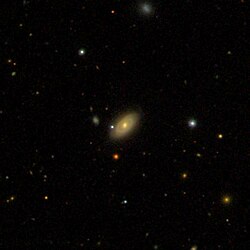NGC 3008
| NGC 3008 | |
|---|---|
 SDSS image of NGC 3008 | |
| Observation data (J2000 epoch) | |
| Constellation | Ursa Major |
| Right ascension | 09h 49m 34.261s[1] |
| Declination | +44° 06′ 09.71″[1] |
| Redshift | 0.01595[1] |
| Heliocentric radial velocity | 4783 km/s[1] |
| Distance | 240.5 ± 16.9 Mly (73.73 ± 5.18 Mpc)[1] |
| Group or cluster | NGC 2998 group |
| Apparent magnitude (B) | 15.23[2] |
| Characteristics | |
| Type | S0/a[1] |
| Other designations | |
| MCG +07-20-059, PGC 28252[1] | |
NGC 3008 is a lenticular galaxy with an active galactic nucleus[3] in the constellation of Ursa Major,[4] discovered by William Parsons and his assistants.[5] It is about 40 thousand light years across, and with a recessional velocity of about 4,785 kilometers per second,[5] is at a distance of 240 million light-years from the Sun.[1]
It is a member of the NGC 2998 group, which also includes NGC 2998, NGC 3002, NGC 3005, NGC 3006, and a few others.[6] Among these galaxies, it has the lowest star formation rate, at 0.02 M☉ per year.[7]
References
[edit]- ^ a b c d e f g h "Results for object NGC 3008 (NGC 3008)". NASA/IPAC Extragalactic Database. California Institute of Technology. Retrieved 2021-02-14.
- ^ "Search specification: NGC 3008". HyperLeda. Université Claude Bernard Lyon 1. Retrieved 2021-02-14.
- ^ "NGC 3008 -- LINER-type Active Galaxy Nucleus". Simbad. Strasbourg astronomical Data Center. Retrieved 17 April 2020.
- ^ "NGC 3008". In-The-Sky.org. Retrieved 17 April 2020.
- ^ a b "Celestial Atlas". cseligman.com. Retrieved 17 April 2020.
- ^ "NAME NGC 2998 Group". SIMBAD. Centre de données astronomiques de Strasbourg. Retrieved 2021-02-14.
- ^ Paudel, Sanjaya; Sengupta, Chandreyee; Yoon, Suk-Jin; Chhatkuli, Daya Nidhi (2020). "MCG+07-20-052: Interacting Dwarf Pair in a Group Environment". The Astronomical Journal. 159 (4): 141. arXiv:2002.10076. Bibcode:2020AJ....159..141P. doi:10.3847/1538-3881/ab722f. S2CID 211258826.
External links
[edit] Media related to NGC 3008 at Wikimedia Commons
Media related to NGC 3008 at Wikimedia Commons


 French
French Deutsch
Deutsch